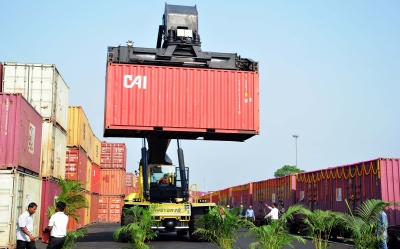The shortage of shipping containers, despite the slowing of Covid 19 cases, has resulted in a loss or postponement of export orders of about $20 billion for Indian exporters even as the country’s total outbound shipment in the April to June period stood at $95 billion—the highest quarterly figure ever.
Though the shortage is no more acute as it was during the first wave of Covid 19, there are delays in movement due to limited manpower in various clearing zones. The problem has also aggravated as most of the most exporters have been relying primarily on Chinese containers.
Also read: India's exports touch $95 billion in April-June quarter–the highest ever: Goyal
India’s need for containers has also increased compared to the pre-Covid phase as orders from Europe and the US have gone up with several nations looking to de-risking their supply chain network.
“Export orders have gone up significantly with fast changing geopolitical dynamics and growing anti-China feeling in Europe and the US. Many countries are willing to source goods from India even at a slightly higher cost,” an exporter of raw materials told India Narrative on condition of anonymity.
Typically, a shipping container from India enroute the US used to take 90 days before the Covid 19 pandemic. Today it takes about 150 days.
“Containers are still in shortage though the world is gradually coming out of the pandemic. Bottlenecks continue to exist,” Ajay Sahai, director general, Federation of Indian Export Organisation told India Narrative.
Shortage of containers, especially in the post Covid 19 era, has been causing delays in shipment of various goods.
“India’s exports could have crossed the $100 billion mark in the first quarter of FY 21 but the shortage of containers has had an impact. Though we cannot say that we have lost out on export orders or business, but definitely the orders and shipment have been postponed,” Sahai added.
Also read: India continues to feed the world as its non basmati rice exports increase by 288% in April
He also said that the movement may normalise only around the third quarter of this financial year.
While the Ministry of Ports, Shipping and Waterways has already set up a committee to study the feasibility of manufacturing containers at Bhavnagar in Gujarat, sources said that other such hubs must also be set up.
Former chairman of the Central Board of Indirect Taxes and Customs Najib Shah in an article in CNBC TV 18 noted that more than 85 per cent of global trade is undertaken in containers.
He added that there are about 17 million containers of 20 foot and 40-foot containers — the standard industry norms “circulating globally and more than 5300 vessels handling exclusively container cargo.”
“Containers thus are necessary for trade. And it is essential that containers move from one port to another; this is determined, like all things, by demand which again gets triggered by requirement-or in other words by the quantum of imports and exports,” Shah wrote.




















